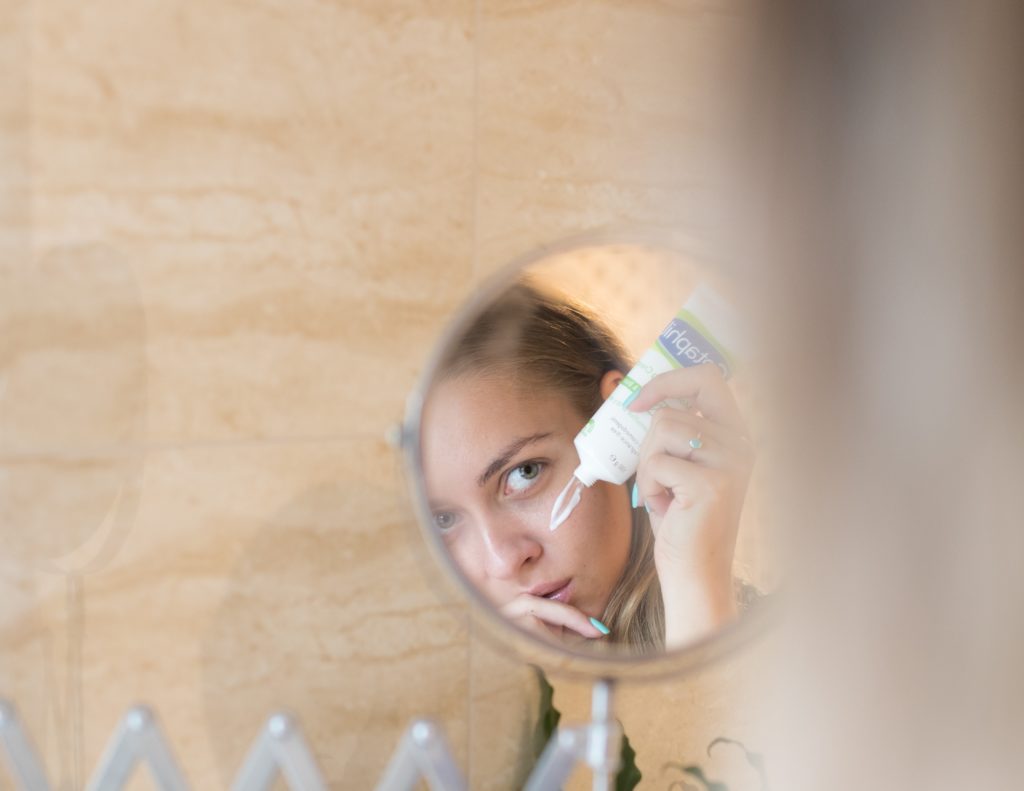
Photo by Humphrey Muleba on Unsplash
Ok, so maybe you struggle with acne, rosacea, melasma, etc. Or maybe you have a child who struggles with one of these things, and you are looking for a product that is tried and true to help! And of course you also want it to be a clean beauty, or safe skincare, product!
So you go to the store, or research online, and sift through all of the product that look like they could work, but you don’t want to try just anything. So, after several minutes (or maybe hours if you’re like me!) of searching, you find a few that say those words you’ve been trying to find!
“Dermatologist Approved” or “Dermatologist Recommended,” “Hypoallergenic,” “Clinical Grade” or “Clinical Strength”
After careful consideration, you select the one, or several products, that looks to be the best of the bunch, and then you start your new skincare regime. Maybe it works great, and maybe it doesn’t……..but what you don’t know is what you’re actually applying to your skin.
But it’s ok, because after-all, it’s dermatologist approved, right? And with the truth in advertising requirement, it must be a safe product, yes?
Well, legally speaking…….unfortunately, no.
You might be thinking, “Wait, Kristin, what do you mean no?!” It’s dermatologist recommended!!”
And while that may be the case, it’s important to know what these sorts of buzz words legally mean in an unregulated industry. So let’s dive in…….
Just because it’s dermatologist approved, doesn’t mean that it’s a safe skincare or clean beauty product
Yes, dermatologists are medical doctors. But, unfortunately, dermatologists are not leaders when it comes to research into safe ingredients. In fact, dermatology as a field has done very little in response to or to address the growing concern and scientific proof that shows many of the ingredients used in these “magical” products aren’t actually safe for human health.
Research over the past four decades has shown that many ingredients used in the personal care and cosmetics industry have harmful effects on our health. This coming from places like Harvard, UC San Francisco/Berkley, Duke U, and many others.
Heck, even medical organizations like the American Public Health Associate, American College of Obstetrics and Gynecology, American Academy of Pediatrics, and many others have made statements attesting to the growing research that these ingredients are harmful to our health.
But even in all of these organizations, dermatologists are not among them. So, basically, just because a dermatologist recommends a certain skincare line, doesn’t mean that the products from that brand are made with safe, non-toxic ingredients.
If you are interested in learning more about the safe skincare and clean beauty brand that I use everyday, on myself and my family, please contact me by clicking the button below!
Clean beauty / Safe Skincare does not mean “hypoallergenic” or “clinical grade” and vice versa
What do I mean by this? Well, just as I’ve mentioned in previous posts, considering that the personal care and cosmetics industry is largely unregulated, companies have free reign over using terms like “hypoallergenic” and “clinical grade” without repercussions when that product does not actually follow suit.
In a nut shell, these are marketing terms that essentially mean nothing. They have no legal definition and, therefore, are thrown onto any product which the company sees fit.
According to the FDA’s website:
“There are no Federal standards or definitions that govern the use of the term ‘hypoallergenic.”
This is also true for terms like “clinical grade” and “all-natural.”
Ok, “dermatologist recommended” may not mean it’s 100% safe skincare or clean beauty, but it does mean that it’s undergone strenuous tests, right?
Wrong again. When a product says it’s “dermatologist recommended” or dermatologist tested, it simply means that dermatologists have tried the product and like it. There is no legal basis for it being recommended, meaning a dermatologist could try it once or several times.
Basically, as long as the dermatologists have either tried it, or they have had someone try it, then they can endorse the product. And it’s important to note that what the dermatologist is focused on, when it comes to a product’s performance, is the results that it has on the exterior layers of the skin. But they aren’t necessarily concerned with how it, or rather the ingredients in it, affects your health in the long run.
The fact that there are so many dermatologist-tested brands out there that include ingredients like parabens, which are linked to endocrine/hormone disruption, retinol, which is linked to speeding the growth of tumors and DNA damage, and hydroquinone, which is linked to both cancer and organ toxicity, is enough evidence for me that long-term health effects are the least of the dermatologists’ concerns.
For more information on other harmful ingredients, pick up my FREE guide by clicking the button below!
What about all the brands featuring dermatologists? Certainly those are legit, right?
Not exactly. In fact, most products are formulated by a third party, rather than by the actual dermatologists endorsing them. But due to their brilliant marketing, these brands would have you believe that there’s a wide array of dermatologists out there that are coming up with their own, amazing products. While this might be true for a very few, it’s not the case for most.
However, though the dermatologists may not have formulated the products, that doesn’t mean that they didn’t agree to be tied to the brand. On the contrary, those dermatologists likely very well believe in the products that they are endorsing, but from the lens of what it does for your skin on the exterior, exclusive of how it affects you on the interior.
In reality, the majority of skincare products are made by third party formulating labs. These labs do employ well-qualified cosmetic chemists, many of which likely do make safe skincare and clean beauty products. But don’t be fooled into thinking that just because there is some imagery of several dermatologists on the website, packaging, commercials, etc, that your friendly neighborhood dermatologist had a hand in creating these products.
That’s why I always say it’s soooo important to do your research, find a brand you trust (not because of their marketing but because of their testing, their values, their commitment to your health), and stick with them! There is only one brand that I really trust with my and my family’s health. If you’d like to learn more about my go-to brand, please contact me by clicking the button below!
I hope that you have found some value in learning about what it really means to be “dermatologist recommended” and how it applies, or rather does not apply to safe skincare and clean beauty products, and will feel more confident in taking your first (or next) steps to achieving true wellness.
If you have found value, please share by clicking on the icons below this article so that I can help your friends and loved ones as well!
Until next time……..
Here’s to achieving true wellness!

P.S – What do you want to know about? Drop me a comment below and let me know what you’d like to learn more about to help you achieve true wellness!
*Legal Disclaimer – All information provided above is for educational purposes only. Information should not be construed as medical or legal advice in any capacity and is not intended to prevent, diagnose, treat, or cure disease.